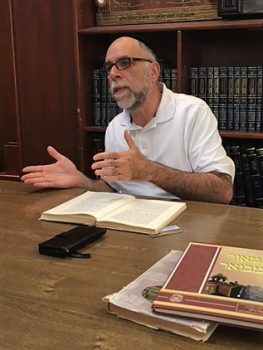We have a saying…
the Shabbat has kept the Jews…”
Every week, in an unbroken chain for over 3,300 years, Torah Observant Jews around the world have been keeping Shabbat.
It is a beautiful experience to take a day off, and sanctify the Shabbat by reciting Kiddush over wine and then break bread over two loaves of Challah with family and friends.
But Shabbat is much more than taking a day off work, as we learn in this week’s Torah portion, VaYachel-Pekudei.
That is SERIOUS business.
I can’t go into the details of how this might be implemented (it is almost impossible to happen even when we have an active Sanhedrin).
But, if this is so serious, it would be important to know what constitutes the kind of “work” that would warrant a death penalty!
What is “work?”
Many people think not working refers to not going to their “job” – place of employment. But what about a lawyer who doesn’t go to the office on Saturday but reviews some briefs at home?
How about a Doctor who performs life saving surgery on Saturday? He’s doing his job. Put him to death?
What about a professional chef who cooks his own meal at home on Saturday? After all, cooking is his work. Or a person in the Landscape Business… can they putter around their own garden on Saturday?

If Shabbat was just a “memorial” that God rested on the seventh day (Genesis 2:2) then it would make sense that each person could determine his or her own way of observing it.
But if a Court can issue a “Death Penalty” for “working” on Shabbat, there better be some detailed explanations of what constitutes “working!” If not, the Torah would be unjust.
MELACHA is not WORK as we understand it.
In fact, the Hebrew word translated as “work” above is “melacha.” It doesn’t mean work in the English sense, there are other Hebrew words like Avoda and Peula that are closer to what we understand as “work.”
The term melacha is used when God creates the world, when the Torah discusses observing Shabbat and when the Tabernacle is built as in this week’s Torah portion. You wouldn’t notice that from reading an English translations.
For a full description of melacha as it relates to Shabbat, CLICK HERE

For me, this verse above which decrees a death penalty for doing “melacha” on Shabbat proves there must be an Oral Torah that we received simultaneously with the Written Torah. Otherwise God and His Torah would be cruel.
There is no detailed description in the Written Torah of what constitutes “melacha” other than references related to building the Tabernacle.
If we want to really “Keep” the Sabbath, we need to learn how to do it from the Oral Torah –. which is what Torah Observant Jews have been doing for the last 3,300 years.
With blessings for a Shabbat Shalom.
PS. If you have any questions or comments, you can simply hit reply to this email and it comes straight to my inbox. I love hearing